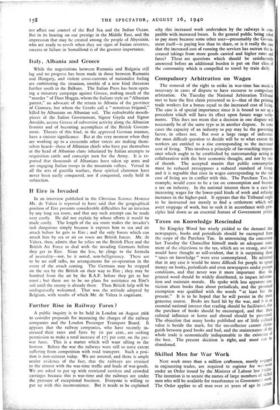Compulsory Arbitration on Wages
The removal of the right to strike in war-time has .made it necessary in cases of dispute to have recourse to compulsory arbitration. On Tuesday the National Arbitration Tribunal met to hear the first claim presented to it—that of the printing trade workers for a bonus equal to the increased cost of living. The case 'is of special importance since it is bound to set up a precedent which will have its effect upon future wage settle- ments. This does not mean that a decision in one dispute will necessarily be of the same type as in another dispute. In some cases the capacity of an industry to pay may be the governing factor, in others not. But over a large range of industries the most difficult question to decide will be to what extent the workers are entitled to a rise corresponding to the increased cost of living. This involves a principle of far-reaching import- ance which ought to be established by statesmanship acting in collaboration with the best economic thought, and not by rule of thumb. The accepted maxim that public consumption must be reduced presupposes a reduced standard of living, and it is arguable that rises in wages corresponding to the real cost of living are in conflict with this. The Purchase Tax, for example, would cease to be a tax on consumption and become a tax on industry. In the national interest there is a case for increasing wages for the lower-paid kinds of work and refusing increases in the higher-paid. It appears that the Tribunal ought to be instructed not merely to find a settlement which will avert stoppage of work, but to seek it in accordance with prin- ciples laid down as an essential feature of Government policy.


























 Previous page
Previous page